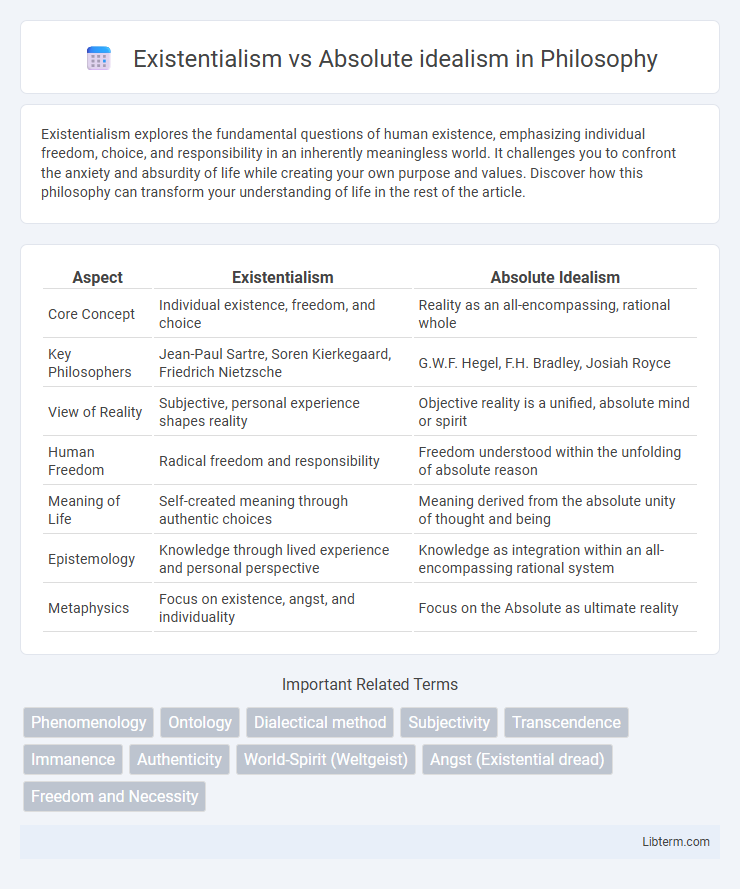Existentialism explores the fundamental questions of human existence, emphasizing individual freedom, choice, and responsibility in an inherently meaningless world. It challenges you to confront the anxiety and absurdity of life while creating your own purpose and values. Discover how this philosophy can transform your understanding of life in the rest of the article.
Table of Comparison
| Aspect | Existentialism | Absolute Idealism |
|---|---|---|
| Core Concept | Individual existence, freedom, and choice | Reality as an all-encompassing, rational whole |
| Key Philosophers | Jean-Paul Sartre, Soren Kierkegaard, Friedrich Nietzsche | G.W.F. Hegel, F.H. Bradley, Josiah Royce |
| View of Reality | Subjective, personal experience shapes reality | Objective reality is a unified, absolute mind or spirit |
| Human Freedom | Radical freedom and responsibility | Freedom understood within the unfolding of absolute reason |
| Meaning of Life | Self-created meaning through authentic choices | Meaning derived from the absolute unity of thought and being |
| Epistemology | Knowledge through lived experience and personal perspective | Knowledge as integration within an all-encompassing rational system |
| Metaphysics | Focus on existence, angst, and individuality | Focus on the Absolute as ultimate reality |
Introduction to Existentialism and Absolute Idealism
Existentialism emphasizes individual freedom, choice, and subjective experience, asserting that existence precedes essence and meaning is self-created. Absolute Idealism, rooted in Hegelian philosophy, posits that reality is an interconnected whole shaped by an absolute, all-encompassing mind or spirit, where individual entities are expressions of this universal consciousness. Both philosophies address the nature of reality and self, but Existentialism centers on personal existence and authenticity, while Absolute Idealism prioritizes the unity of all being through an absolute, rational framework.
Historical Origins and Key Philosophers
Existentialism emerged in the 19th and 20th centuries with key philosophers such as Soren Kierkegaard and Jean-Paul Sartre, emphasizing individual freedom, choice, and subjective experience as central to human existence. Absolute idealism originated in the early 19th century, primarily through Georg Wilhelm Friedrich Hegel, who proposed that reality is the manifestation of an absolute, universal mind or spirit. While existentialism focuses on personal meaning and authenticity, absolute idealism centers on the unity of all reality through an all-encompassing consciousness.
Core Principles of Existentialism
Existentialism centers on individual freedom, subjective experience, and the inherent meaninglessness of life, emphasizing personal responsibility in creating meaning. It rejects absolute, universal truths, contrasting sharply with Absolute Idealism, which asserts that reality is ultimately shaped by an all-encompassing, rational mind or spirit. Core principles of existentialism include authenticity, angst, and the primacy of existence over essence.
Foundational Concepts in Absolute Idealism
Absolute Idealism centers on the foundational concept that reality is an interconnected, all-encompassing consciousness or spirit, where individual minds and material objects are manifestations of this singular, absolute reality. It posits that truth and existence are unified in a holistic system, rejecting the notion of isolated entities and emphasizing the synthesis of subject and object. This contrasts with Existentialism, which prioritizes individual freedom, subjective experience, and the inherent ambiguity of human existence.
Conceptions of Reality: Subjectivity vs. Absoluteness
Existentialism emphasizes reality as fundamentally subjective, centered on individual human experience, freedom, and personal meaning-making, rejecting any fixed or universal essence. Absolute idealism asserts reality as an interconnected, all-encompassing whole, where individual consciousness participates in an absolute, objective mind or spirit. The core distinction lies in existentialism's focus on personal existence and contingency versus absolute idealism's belief in an ultimate, rational unity beyond individual experience.
The Role of Individual Freedom and Responsibility
Existentialism emphasizes individual freedom as the foundation of human existence, asserting that individuals must create their own meaning and bear full responsibility for their choices. Absolute idealism, in contrast, views freedom as embedded within a universal rational structure, where individual freedom is realized through alignment with an absolute, collective consciousness. This philosophical divergence highlights existentialism's stress on personal autonomy and accountability versus absolute idealism's integration of freedom within a holistic, rational order.
Perspectives on Meaning and Existence
Existentialism centers on individual freedom, choice, and the inherent meaninglessness of life, emphasizing that meaning is self-created through personal experience and authentic existence. Absolute idealism, particularly in Hegelian philosophy, posits that reality and meaning are unified in an all-encompassing absolute spirit or consciousness, where existence gains purpose through the dialectical unfolding of this universal mind. These contrasting perspectives highlight existentialism's focus on subjective meaning-making versus absolute idealism's emphasis on an objective, metaphysical source of meaning embedded in the totality of being.
Nature of Truth and Knowledge
Existentialism asserts that truth is subjective and knowledge is rooted in individual experience and personal meaning, emphasizing authenticity and human freedom. Absolute idealism holds that truth is an objective, all-encompassing reality where knowledge emerges through the dialectical development of the Absolute Spirit or Mind. Existentialism prioritizes lived experience as the source of truth, while Absolute idealism views truth as a unified, rational totality accessible through philosophical reasoning.
Critiques and Debates between the Traditions
Existentialism challenges Absolute Idealism by rejecting the notion of an all-encompassing, rational Absolute, emphasizing individual experience, freedom, and subjective meaning instead. Critics of Absolute Idealism argue that its abstract, universal concepts overlook personal existence and concrete realities, which existentialism highlights through engagement with angst, choice, and absurdity. Debates between these traditions center on the validity of universal metaphysical systems versus the primacy of lived experience and authenticity in understanding human existence.
Contemporary Relevance and Applications
Existentialism, emphasizing individual freedom and subjective experience, shapes contemporary debates in ethics, psychotherapy, and political theory by addressing personal authenticity and human agency. Absolute idealism, rooted in the belief that reality is a manifestation of an all-encompassing mind or spirit, influences modern philosophical inquiries in metaphysics and epistemology, particularly within discussions on the nature of consciousness and reality. Both frameworks inform current interdisciplinary studies, integrating philosophy with psychology, cognitive science, and social theory to explore the complexities of human existence and knowledge.
Existentialism Infographic

 libterm.com
libterm.com